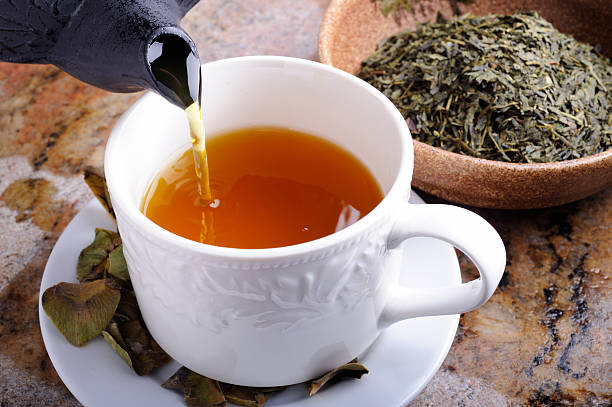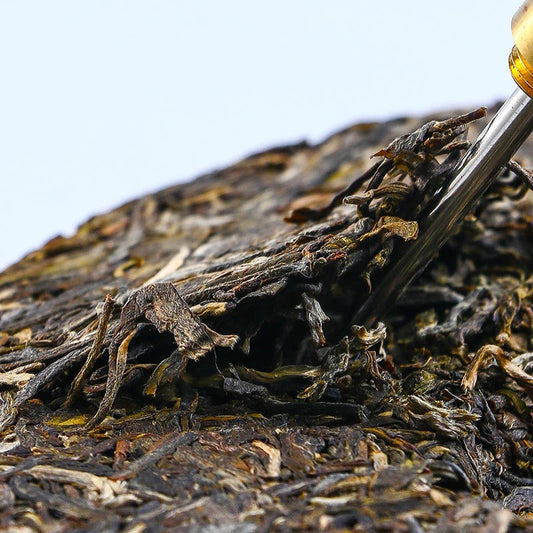Overview
Do you enjoy sipping green tea every morning?
While it can be a refreshing start to your day, drinking Green Tea on an empty stomach might not be the best choice. There are many aspects that you may not be aware of, and even if you think you know it all, there's always more to discover. In this blog, we will explore the benefits, potential side effects, and various types of green tea to enhance your understanding and enjoyment of this popular beverage.
Table of contents
- Introduction
- What is Green Tea?
- Green Tea Benefits and side effects
- Green tea Benefits for Skin
- Green Tea benefits for Women
- Green Tea Benefits for Stomach
- Green Tea Before Bed
- Green Tea and its other Variants
- Conclusion
Introduction
While most people are aware of green tea's health benefits, few realize that excessive consumption can lead to unexpected side effects. We all know about green tea but there are many aspects we haven’t discovered. Moreover, the Green tea was found around 2737 BC in China. Now we have found out it's different varieties the benefits, side effects, everything about it has been researched and it's still being researched. There are still some facts that haven’t been proven.
What is Green Tea?
Green tea is made from leaves harvested from the Camellia sinensis plant. After harvesting, the leaves are quickly heated—either by pan firing or steaming—and dried to prevent excessive oxidation, which would turn the green leaves brown and alter their fresh-picked flavour. Especially a brewed one is typically green, yellow, or light brown in color; furthermore, its flavor profile can range from grass-like and toasted (pan-fired) to vegetal, sweet, and seaweed-like (steamed). If brewed correctly, in general, most of them should be quite light in color and only mildly astringent.

Green Tea Benefits and side effects
At first we can talk about the Benefits:
1. Alleviates Anxiety and Stress
It contains L-theanine, which helps alleviate anxiety and stress. Compared to other teas, green tea has a higher concentration of this amino acid. Studies show that taking 200 milligrams of L-theanine daily can significantly improve anxiety, depression, and sleep.
2. Helps Protect Against Cognitive Decline
Drinking green tea may protect against neurodegenerative diseases like Alzheimer’s and Parkinson’s. Its high antioxidant content helps combat cell damage and oxidative stress. This protection could help maintain cognitive function and delay symptoms of dementia.
3. Supports Bone Health
Green tea might reduce the risk of osteoporosis, particularly in postmenopausal individuals. The Antioxidants may enhance bone formation and prevent bone mass loss. This support can contribute to better bone health and lower fracture risk.
4. Improves Longevity
Consuming green tea may contribute to a longer, healthier life. The polyphenols act as antioxidants, reducing inflammation and oxidative stress. These effects may help decrease visible signs of aging and improve overall longevity.
5. Lowers Cholesterol
Green tea has been shown to lower LDL ("bad") cholesterol and total cholesterol levels. This can be particularly beneficial given the high prevalence of cholesterol-related health issues. Regular consumption may reduce the risk of heart attacks and strokes.
6. May Enhance Memory
The L-theanine may boost memory and cognitive function. A 2014 study found that green tea extract improved working memory and brain connectivity in healthy volunteers. These potential benefits make green tea a promising option for enhancing cognitive performance.
7. May Manage and Prevent Type 2 Diabetes
Green tea could help manage and prevent type 2 diabetes by reducing insulin resistance. Antioxidants in green tea support better insulin response and glucose regulation. This can lower the risk of developing type 2 diabetes.
8. Might Lower Stroke Risk
Drinking green tea might reduce stroke risk, a leading cause of death and disability. A 2023 study indicated that moderate daily consumption could lower stroke risk by at least 21%. Lifestyle factors, including green tea consumption, may contribute to this reduced risk.
9. Might Support Weight Loss
Green tea can aid in weight loss due to its catechin content, which helps break down fat. It may increase metabolic rate and calorie burning, especially during exercise. Combining this with a balanced diet and regular exercise enhances its weight loss benefits.
10. Reduces Blood Pressure
It may help lower blood pressure and support heart health. Research shows that its antioxidants can significantly reduce blood pressure, particularly in those at high risk for heart disease. This effect is due to decreased inflammation and improved blood vessel dilation.
Now we can discuss about the side effects.
1. Affects Pregnancy
Drinking green tea may be safe during pregnancy and while breastfeeding when consumed in amounts up to 6 cups per day (no more than about 300 mg of caffeine). Drinking more than this amount during pregnancy may be unsafe and may increase the risk of negative effects. ItI may also increase the risk of birth defects associated with folic acid deficiency. Caffeine passes into breast milk and can affect a breastfeeding infant.
2. May cause Liver Injury
Green tea is an ingredient in many over-the-counter weight loss products, some of which have been identified as the likely cause of rare cases of liver injury.
3. Reduces Blood Levels
Green tea at high doses has been shown to reduce blood levels and therefore the effectiveness of the drug nadolol, a beta-blocker used for high blood pressure and heart problems. It may also interact with other medicines.
Green tea Benefits for Skin
While Green Tea has numerous health benefits it also makes the skin better.
1. Reduces skin inflammation
Green tea contains a significant number of polyphenols called catechins. Furthermore, the presence of catechins helps reduce irritation, redness, swelling, and itching caused by psoriasis, dermatitis, rosacea, or any other medical condition.
2. Treats Acne
The antioxidant, anti-inflammatory, and antimicrobial properties make it an effective acne treatment. Moreover, the polyphenols can combat infections by damaging bacterial membranes, which, in turn, helps control acne.
3. Clears clogged pores
Clogged pores are the result of dead skin cells getting trapped in your skin. Pores are the little opening in the skin that release unwanted oil and sweat. When your pores are clogged, it can result in blackheads, whiteheads, and acne, which are some of the most common skin problems.
4. Fights premature Ageing
This contains substances that eliminate free radicals. This is one of the best ingredients to firm skin, prevent wrinkles and provide intense nourishment and hydration.
5. Hydrates the skin
It contains vitamin E that is known for its ability to nourish and hydrate the skin. It not only moisturises the skin, but also brightens and repairs it.
Green Tea benefits for Women
As we discussed about the numerous health benefits it also provides better health results for women.
1. Supports in Weight Management
It is known to boost metabolism and enhance fat oxidation, making it an effective ally in weight management. However, research shows that the catechins can increase calorie burning, helping women achieve their weight loss goals.
2. Rich in Antioxidants
Packed with powerful antioxidants, especially catechins, it helps to combat oxidative stress. These antioxidants may reduce the risk of chronic diseases, promoting overall health for women.
3. Promotes Healthy Skin
The antioxidants can protect the skin from UV damage and improve overall skin health.
4. Supports Heart Health
Studies suggest that green tea consumption is linked to a lower risk of heart disease. By lowering LDL cholesterol levels and improving blood vessel function, it significantly contributes to cardiovascular health in women.
5. Reduces Cancer Risk
Research indicates that it may lower the risk of certain cancers, including breast cancer and ovarian cancer. Additionally the antioxidant properties play a crucial role in this protective effect.
6. Enhances Mental Clarity
Green tea contains L-theanine, an amino acid that, when combined with caffeine, can improve cognitive function and focus.
Green Tea Benefits for Stomach
Especially Green tea has always been regarded as somewhat of a miracle worker, especially regarding Stomach health. There are numerous benefits for stomach.
1. Populates healthy bacteria in the intestines
Consumption of green tea has been linked to improving gut health by populating healthy bacteria in the intestines. Research has been conducted in Ohio State University that has found evidence proving that it can encourage the growth of gut bacteria, leading to a litany of benefits, including lowering the risk of obesity.
2. Improves Digestion
A study by Yan and colleagues reveals that green tea is rich in polyphenols, helping the body improve its digestive process. To the uninitiated, polyphenols are digestive compounds found in the tea plant.
3. Suppresses food allergies
Recent research from Shinshu University in Japan has revealed that certain gut microbes can influence the immune system's response to allergens. Led by tea expert Tasuku Ogita, the study found that Flavonifractor plautii, a beneficial strain from the Clostridia family, can alleviate inflammation and enhance immune function. This bacterium is triggered by catechin antioxidants and effectively suppresses Th2 immune cells, which are responsible for food allergies.
Green Tea before Bed
While, it offers numerous health benefits, including improved sleep quality. However, consuming it right before bedtime may hinder your ability to fall asleep and increase night time urination.
1. Promotes Better Sleep
Additionally this tea contains L-theanine, which reduces stress and helps you relax, leading to deeper sleep.
2. Reduces Anxiety
A warm cup of this tea can calm your nerves and lift your mood, thanks to it's stress-relieving properties.
3. Supports Heart Health
Green tea is good for your heart. Studies show it can lower cholesterol and reduce the risk of heart disease, helping you stay healthy.
4. Aids Weight Loss
Drinking it at night can help you lose weight. It boosts metabolism and helps your body burn fat more efficiently.
5. Improves Oral Health
Green tea helps keep your mouth healthy by fighting bacteria that cause cavities and promoting gum health.
6. Boosts immunity
Green tea can strengthen your immune system and help you fight off common illnesses.
7. Enhances Skin and Hair
Green tea is great for your skin and hair. It can help reduce wrinkles, improve skin texture, and promote hair growth.
8. Boosts Brain Function
Green tea can improve your focus and memory. The caffeine and L-theanine work together to enhance brain activity.
However there are some downsides to this that includes,
1. Difficult to fall asleep
Green tea contains some caffeine. This natural stimulant promotes a state of arousal, alertness, and focus while reducing feelings of tiredness — all of which can make it more difficult to fall asleep.
2. It may interrupt your sleep
Having to get up to use the toilet in the middle of the night can interrupt your sleep, causing you to feel tired the next day.
There’s currently no evidence to suggest that drinking it at night is any more beneficial for sleep than drinking it throughout the day.
Green Tea and its other Variants
There are many variants of Green Tea.
1. Decaf Green Tea
Enjoy the natural goodness of Decaf green tea a mild and chemical-free blend from Sri Lanka. Its gentle flavor and health-boosting flavonoids promote a pleasant sense of well-being.
- Caffeine Level: Negligible
- Aroma: Vegetative
- Appearance: Pale Yellow
- Taste: Delicately sweet
2. Sencha
Sencha is Japan’s most famous green tea, known for its luxurious taste. This tea is carefully steamed and rolled, offering a fresh and herbal aroma that helps relieve stress.
- Caffeine Level: Moderate
- Aroma: Fresh, Herbal
- Appearance: Vibrant Green
- Taste: Delicately sweet with a subtle tang
3. Matcha
Matcha has a rich history, once enjoyed by Buddhist monks. This vibrant powder, when whisked with water, creates a delicate infusion that promotes calm and enhances meditation.
- Caffeine Level: High
- Aroma: Fresh, Vegetal
- Appearance: Vibrant Green
- Taste: Delicately sweet with slight astringency
4. Jasmine Tea
Jasmine combines green tea leaves with fresh jasmine blossoms, creating a floral and sweet aroma. This tea offers a refreshing and healthful experience.
- Caffeine Level: High
- Aroma: Floral, Sweet
- Appearance: Pale Green
- Taste: Herbal, slightly tangy
5. Gunpowder Tea
Gunpowder Tea features tightly rolled pellets that preserve freshness and aroma. This unique tea originated from Chinese alchemists and is known for its strong, toasty flavor.
- Caffeine Level: High
- Aroma: Smoky
- Appearance: Misty Green
- Taste: Strong and Toasty
6. Hojicha
Hojicha is a roasted green tea with a warm, toasty flavor. This tea originated in the 1920s and has gained worldwide popularity for its unique aroma and taste.
- Caffeine Level: Moderate
- Aroma: Intense, Roasted
- Appearance: Red-brown
- Taste: Toasty with a hint of caramel
7. Lotus Tea
Lotus Tea is created by wrapping green tea leaves in freshly bloomed lotus flowers, infusing them with a rich floral aroma. Hence traditional Vietnamese tea offers a unique and delightful flavor.
- Caffeine Level: High
- Aroma: Rich, Floral
- Appearance: Pale Gold
- Taste: Sharp with a subtle sweetness
8. Dragon Well
Dragon Well tea is hand-plucked and roasted for a delicate flavor. Moreover, this historical tea has royal roots and is known for its mild taste reminiscent of toasted chestnuts.
- Caffeine Level: High
- Aroma: Delicate, Toasty
- Appearance: Pale Yellow
- Taste: Mild with a delicate flavor of toasted chestnuts
There are Other teas to try out like White Tea which offers a different taste and different aroma.

Conclusion
In conclusion we have covered everything you need to know about green tea. Additionally it improves cognitive function also helps in promoting heart health, improving skin and aiding digestion, it stands out as a powerful beverage with diverse advantages. While it's essential to be mindful of potential side effects, the numerous advantages make it worthy addition to your daily routine. It can be harmful if its consumed more than the recommended level. However if you're seeking to diversify your tea experience, consider giving Pu-erh tea a try.
Q&A Section
Q1: Is it good to consume green tea everyday?
A1. Yes, consuming it in moderation (1-2 cups daily) may provide various health benefits. However, it’s crucial to be aware of individual caffeine sensitivity and potential interactions with medications.
Q2. Is green tea healthier than regular tea?
A2. Yes,higher antioxidant content, particularly catechins, and lower caffeine levels may make it a slightly healthier option
Q3. Does Green tea Contain Caffeiene?
A3. Yes, a typical 8-ounce cup of green tea may contain between 30-50 mg of caffeine.






